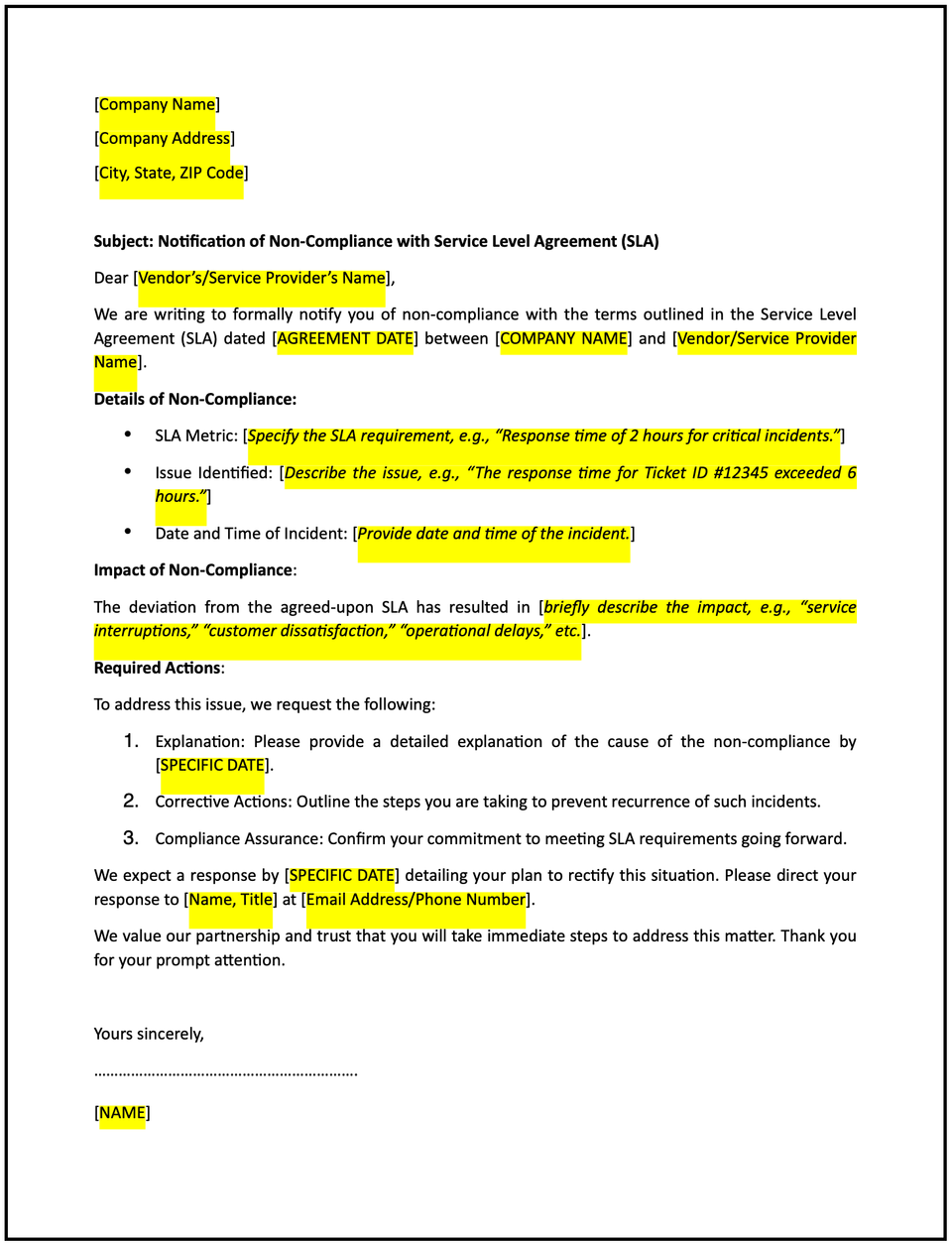Letter of non-compliance with service level agreement (SLA): Free template

Letter of non-compliance with service level agreement (SLA)
A notification letter of non-compliance with a service level agreement (SLA) is a formal communication used to inform a service provider about their failure to meet agreed performance standards. This letter outlines the specific breaches, their impact, and requests corrective action to address the issue and prevent recurrence.
How to use this letter of non-compliance with service level agreement (SLA)
- Open with an introduction: Address the service provider respectfully and reference the SLA by number, date, or specific terms.
- State the purpose: Clearly communicate that the purpose of the letter is to notify them of non-compliance with the SLA.
- Provide details: Specify the SLA metrics or obligations that were not met, including dates, times, and evidence if applicable.
- Highlight the impact: Explain how the non-compliance has affected your operations, customers, or overall business objectives.
- Reference the agreement: Mention the specific SLA clauses or terms that outline the performance expectations.
- Request corrective action: Propose solutions or corrective measures to address the non-compliance and prevent future occurrences.
- Express commitment: Reaffirm your intention to maintain a productive relationship while resolving the issue.
- Maintain a professional tone: Ensure the letter is clear, respectful, and focused on collaboration.
- Provide contact information: Include details for the recipient to reach out with questions or to discuss further.
Benefits of using a letter of non-compliance with service level agreement (SLA)
This letter ensures a structured and professional way to address SLA breaches while fostering accountability and collaboration. Here’s how it helps:
- Promotes accountability: Highlighting non-compliance encourages the provider to meet agreed standards.
- Reflects professionalism: A well-crafted letter demonstrates respect and a commitment to resolution.
- Encourages improvement: Providing specific details allows the provider to focus on corrective actions.
- Builds trust: Transparent communication reinforces a positive working relationship.
- Supports operational efficiency: Addressing SLA breaches promptly ensures minimal disruption to your business.
Tips for writing an effective letter of non-compliance with service level agreement (SLA)
- Be specific: Clearly describe the SLA breaches, referencing agreed metrics, clauses, or expectations.
- Use professional language: Maintain a respectful and constructive tone to foster collaboration.
- Provide context: Briefly explain how the non-compliance has affected your business or operations.
- Highlight mutual benefits: Emphasize how resolving the issue supports both parties’ success.
- Include actionable steps: Share instructions for addressing the issue, such as scheduling a review meeting or implementing corrective measures.
- Keep it concise: Focus on the essential points while ensuring the tone is professional and engaging.
Frequently asked questions (FAQs)
Q: What details should I include in this letter?
A: Include references to the SLA, specifics of the non-compliance, its impact, and proposed corrective actions.
Q: Should I personalize the letter?
A: Yes, addressing the provider by name and referencing the SLA details demonstrates attentiveness and professionalism.
Q: Who typically sends this letter?
A: Procurement managers, operations teams, or business owners typically send this letter.
Q: How formal should this letter be?
A: The tone should be professional, respectful, and focused on fostering resolution.
Q: When should this letter be sent?
A: Send the letter promptly after identifying the SLA breach to ensure timely resolution.
Q: Can this letter include evidence of non-compliance?
A: Yes, attaching relevant documentation or data strengthens the case and supports clarity.
Q: Is acknowledgment from the recipient required?
A: While not mandatory, requesting acknowledgment ensures the provider understands and accepts the issue.
This article contains general legal information and does not contain legal advice. Cobrief is not a law firm or a substitute for an attorney or law firm. The law is complex and changes often. For legal advice, please ask a lawyer.


